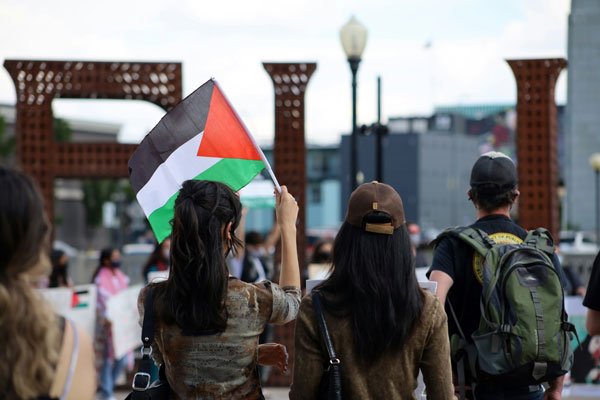Pro-Palestinian protests at Emory University provoke controversy on police brutality and U.S. ties with Israel

[Pro-Palestinian Protest. Photo Credit to Unsplash]
Pro-Palestinian protests against U.S. universities’ affiliations with Israel during the current Isreali-Hamas war have provoked controversy and raised concerns about police responses, freedom of speech, and different opinions on the justification of arrests.
The protests, which began at Columbia University, quickly spread to several other universities, highlighting solidarity with the people of Gaza.
On April 25, 2024, Emory University students gathered on campus for a peaceful protest, urging the school to stop supporting companies supporting the war in Gaza and to cut financial ties with Cop City, a law enforcement training facility that resembles Israel’s Warfare Training Center.
By April 26, 2024, Pro-Palestinian protestors had taken over a major part of Emory’s campus to voice thier opposition to the Israel-Palestine war.
Several protestors unaffiliated with Emory trespassed onto university grounds to set up tents and disrupt ongoing classes.
The American Civil Liberties Union (ACLU) said Atlanta, the home of Emory, has historically been a place where citizens could freely exercise protests.
However, they highlighted that several protests faced unlawful repression.
The protests brought to light how society felt about the freedom of speech because of the detrimental consequences, mainly caused by the police response.
The public was confused about why the police responded to the protest with force and assaulted protestors, especially since photos on social media from multiple sources showed peaceful protesting.
One incident involved an economics professor who, despite peacefully protesting, was forcibly arrested and charged with threatening an officer.
Police intervened with tear gas, rubber bullets, and stun guns, raising allegations of excessive force and racial targeting.
The balance between freedom of speech and police intervention became a contentious issue among politicians.
State Representative Ruwa Romman criticized that the Georgia State Patrol’s tactics as overly forceful.
Dr. Noelle McAfee, the chair of Emory’s philosophy department, defended the protests, claiming that student activism plays a crucial role in democracy and that Emory should not conform to police pressure.
Conversely, a few politicians reacted positively to actions taken by the police saying that it was necessary as a few protestors terrorized Jewish students.
Governor Brian Kemp commended the police for their quick intervention, while Israeli Prime Minister Benjamin Netanyahu labeled the ongoing U.S. protests as antisemitic.
Due to ongoing protests and several conflicting points, several universities in which pro-Palestine protests are actively taking place have delayed their graduation ceremonies.
Columbia University canceled its university-wide commencement ceremony because of pro-Palestinian protests.
At Duke University and UC Berkeley, pro-Palestine students protested during the commencement ceremonies, eventually being escorted by the police.
However, despite efforts made by several students and professors at various universities, President Joe Biden signed a law funding $94 billion in military aid to Israel, Ukraine, and Taiwan.
The package provided Israel with $17 billion, despite several protests against the US continuing to fund Israel.
Nihad Awad, the director of the Council on American-Islamic Relations (CAIR), mentioned how President Biden betrayed them by disregarding the wishes of the American people to stop supporting Israel.
Even President Biden criticized Israel, suggesting that he would reconsider support if the Israeli government did not allow more aid to reach Palestinians in Gaza.
The visibility of the Israeli-Hamas war has been rising in the U.S. as Pro-Palestinian protests create controversy among politicians and the public regarding police brutality and other factors.
Although excessive protesting delayed several university ceremonies and involved police, it has had some effect in changing the government's decisions.
Student-led activism and protests beginning at Emory and spreading across U.S campuses are proof that with enough traction, citizens can evoke a response from not only the U.S. government but also the rest of the world.

- Matthew Park / Grade 9
- Seoul International School

![THE HERALD STUDENT REPORTERS [US]](/assets/images/logo_student_us.png)
![THE HERALD STUDENT REPORTERS [Canada]](/assets/images/logo_student_ca.png)
